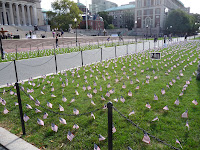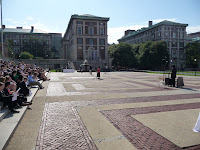





I visited Columbia for the 10th anniversary
commemoration of 9/11. Organized by the Chaplain's office, the morning memorial was a solemn but also modest and low-key affair on Low plaza. My sense is that this year's 9/11 commemorations will be the last at Columbia. With Osama bin Laden killed, years of vitriolic partisan clash and conspiracy-mongering sapping our collective will to fight (see Mao's
guidance on psy-ops in guerrilla warfare), and our imperiled economy the proximate concern, most Americans believe a decade on is the appropriate time to relegate 9/11 to history. By now, most 9/11 remembrances are sanitized of determined resolve to fight the enemy and more akin to recalling a unique disaster (like a plane accident or hurricane) than an ongoing contest. Republican and Democrat politicians both want to
move on from the war. The problem is that the mission that our nation undertook after 9/11, what we knew then would be a Long War, is not finished. The enemy continues to vigorously compete. I'm glad YAF put out its "Never Forget" memorial on College Walk . . .
<aside> Ron Lewenberg was right -
Students United for Victory should have stayed focused on non-partisan support for the war effort instead of widening its focus to become
Students United for America. When I made the decision to alter our course, SU4V was struggling and our founding purpose seemed too narrow to sustain a long-term life for the group. I believed redesigning SU4V to SU4A was a needed boost. I was also ambitious, aggressive, cognizant of the short window for student activists, and unwilling to take a step back. SU4A's mission of unifying Americans and solutions for the nation's challenges, including the War on Terror, reflected my deeper concern for America and was important, too; the SU4A concept is vindicated by the partisan gridlock, acrimony, and compounding problems our nation is afflicted with today. But the practical, unintended consequence of widening the focus from SU4V to SU4A is that SU4V's founding purpose was diluted and distracted from until eventually,
SU4A lost the mission of supporting the war effort altogether. I designed the SU4A mission to be plastic around a set of core values in order to adapt to the needs of the nation, but that plasticity led the group to devolve into meaninglessness. In hindsight, SU4V's original tasks of countering misinformation, encouraging sober discourse, and maintaining non-partisan support for the War on Terror outweighed the broader SU4A mission. Since 9/11, our highest elections and national policy decisions have been influenced by popular opinion on the War on Terror. SU4V's mission and character were unique at Columbia and its founding purpose, while narrow in scope, should have been preserved. That said, weighing the alternatives in 2002 wasn't simple. I'm not discounting my contemporary analysis that SU4V would be short-lived without the SU4A redesign. That Ron was right doesn't necessarily mean I was wrong; SU4V was struggling and, in the short term, SU4A did work as intended. But the fact is SU4A failed to survive in the long term, and SU4V died with it. Knowing what I know now, I would have tried harder to preserve SU4V in its founding form, even if its survival would have required contracting the group to marginal production and a modest size. I could have innovated other ways, as we did with ICRA and the ROTC movement, to pursue the goals I conflated in SU4A. My call and my mistake. </aside>
. . . The War on Terror is like fighting cancer and quitting the treatment halfway guarantees a weakened body left to the mercy of an evolutionarily toughened disease. Certainly, the economic cost of the war is a key consideration. Economic power is a prerequisite of military power and America's economic standing is shaky right now. Assuming we don't abandon the struggle, the question is how we adapt to keep up the fight at a sustainable - and a winnable - level. It could be that we actually will compete more agilely against the terrorists when we're forced to adapt and innovate with less funding and resources. Coupled with a defter footprint, less media attention could mean more creative room for our operators, too.
I agree with
Richard Landes. Too many leaders, political and cultural, responded to 9/11 with nearsighted partisanship rather than patriotism, and retrenched in their preferred beliefs rather than a sober assessment of what we need to do to solve very complex problems and defeat a focused, aggressive enemy whose competitive advantage is powered with those same problems. A few celebrities at home have even sought to actively undermine our war effort as barbaric, a monstrous conspiracy, and a purposeful distraction from social priorities. Before 9/11, global critics - not only competitors, but some beneficiaries of
Pax Americana - maligned American world leadership as a dangerous "hyperpower" that must be reined in and controlled. Since 9/11, many others have accused America of being the root cause of the world's problems, even as we're struggling against truly toxic entities and championing liberal reform. Their narrow perspective implicitly excuses anyone opposing us - even terrorists - as righteously standing up to American hegemony while also, tragically, implicitly dismissing anyone who cooperates with America - even courageous liberal reformers - as illegitimate, a lackey at best or traitor at worst. The commitment to blame America is so extreme for some, they've even blamed the body count from the terrorists' assassinations, mass murders, and other depravities on the US. Early in the 9/11 debates, I described this enabling outlook as 'terrorist-as-proxy', meaning people opposed America in the War on Terror not because they necessarily shared the terrorists' cause, but because they ascribed their various grievances against America to the terrorists' struggle. The terrorists have learned to use this self-destructive Western mindset by tailoring their propaganda to the blame-America-first narrative.
Our choices in the War on Terror on 9/11 were to try harder with our limited pre-9/11 strategy, full isolationist withdrawal, a killing war, or armed intervention with fundamental liberal reform (as opposed to simple democracy). We chose to fight for a liberal peace and reform of a dysfunctionally crippled, conspiracy-addled part of the world. Radical political Islam seems to be a zealous
religious version of Communism that promises a similarly centralized systemic antidote for the evils of class, individualism, and capitalism, and shares Communism's killing hatred of liberalism. In the 3-way contest between Islamists, old-school dictators (and would-be dictators), and liberal reformers, the liberal reformers don't have a chance without our intervention. In that part of the world, liberal reformers are by far the weakest group and opposed by killers. If we abandon the liberal reformers, they're
dead.
The enemy is
4GW, resilient, adaptable, thinking, and manipulative. He thinks pragmatically in the big picture and long view, while partisans in the West often seem deliberately obtuse. The enemy is totally committed to the revolution for a new world order. For the 9/11 attacks, the terrorists didn't need prodigious resources, merely the will to win by any means necessary and masterful use of our vulnerabilities, preferences, and beliefs against us. Meanwhile, the enemy protects himself by embedding in the black-market areas (eg, narcotics, smuggling, failed states) outside of the normal authority of our world order. The dictators of nation-states are within our conventional reach; the Islamists are not.
Our goal of liberal reform in the War on Terror is bottom-up and must begin with change at the granular personal level. The changes we need to happen have a
much better chance of taking root in Iraq than in Afghanistan, but New York Times article
Many Iraqis Have Second Thoughts as U.S. Exit Nears by Michael S. Schmidt hints at the psychological obstacles to liberal reform there. With great sacrifice battling vicious illiberal forces on Iraq's behalf and enormous investment into the new Iraq, America has given Iraq the opportunity for liberal reform, but if Iraqis are unable to overcome their modes of thinking, we can't make them do so. The article shows Iraqis sensing the opportunity for a better future slipping away, but their handicapped thinking is sabotaging their ability to seize the opportunity. (It's only human of them; as Richard Landes explained above, Westerners are equally suspectible to trapping themselves with handicapped thinking.) The situation reminds me of the subjects on the A&E show
Intervention: with the reality of the American military's departure facing them,
now may be the moment where Iraqis are finally ready to change with the proper assistance from us. The competitive illiberal forces inside and surrounding Iraq have not been neutralized. We should continue to play an active role assisting Iraq, though our future guidance may not be predominantly military in character. America's Iraq mission should adapt, not end.
On a personal level, 9/11 knocked me off my plan to find my life path at Columbia. Contemplating the ash cloud downtown that was the World Trade Center, aware of the notorious history of American college students in the Vietnam War, I felt a powerful responsibility to support America, especially our soldiers going to war, as a new student and recent soldier on campus. I became a
columnist and
campus activist and passionately
debated about the War on Terror and American hegemony and leadership. I learned what naive passionate activists often learn: doing your best to make a difference may only result in a disappearing difference in the long run, no matter how promisingly flashy the immediate returns. My classmates who claimed the best way they could respond to 9/11 was to succeed in their chosen niche were right after all. Student activists who give up their self interest for the cause do so at the risk of becoming less than they could have been, which means they'll have less to bring to the table in the long run, for themselves, their future family, and society-at-large. Lesson for student activists: think of yourself as the goose that lays the golden eggs. If you give in to the temptation to sacrifice yourself in the now, then you may have too little to give in the future. (That's not to say all my
activist efforts were wasted.) For all that I did at Columbia in reaction to 9/11, though, I feel as though I still have unfinished business - that I have not done
my part. But what can I do? Perhaps as others move on, they'll leave room for me to work that otherwise would not have been open. Maybe the folks who stay behind will be able to do more. Or maybe bureaucrats will occupy all the available opportunities to make a difference and squander them.
Also see
10 year anniversary of the start of Operation Iraqi Freedom: thoughts.
Eric
Labels: 9/11 anniversary, iraq, veteran










